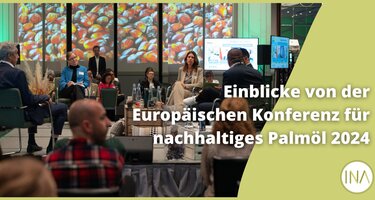European Sustainable Palm Oil Conference 2024
Given that the agriculture, forestry and other land use (AFOLU) sectors account for 13-21% of global greenhouse gas emissions, the conference emphasised the urgent need for a shift towards climate-resilient and sustainable practices in the palm oil sector and the empowerment of smallholder farmers.
This year’s Sustainable Palm Oil Conference (SPOD) brought together various actors under the Multistakeholder Initiative Roundtable for Sustainable Palm Oil (RSPO) to explore inclusive pathways for climate-smart solutions. Recognizing that Agriculture, Forestry, and Other Land Use (AFOLU) sectors contribute 13-21% of global GHG emissions, the conference emphasized the urgent need for a transformation towards climate-resilient and sustainable practices in the palm oil sector as well as empowering smallholders.
An article by Joy Heitlinger
While smallholder farmers are most affected by the impacts of climate change, the conference assessed the critical role of corporate leadership in addressing climate change within the palm oil sector and the readiness of the sector. Key speakers emphasized the need for businesses to take more responsibility in mitigating climate impacts through sustainable practice and to continue viable sustainable oil palm supply chains which will need to remain inclusive for smallholders, which compose around 40% of the supply chain.
A recurring theme was the need to empower smallholders. Discussions centered the emphasis on data ownership and ensuring that smallholders are integrated into the traceability systems as vital for compliance with the European Deforestation Regulation (EUDR). The conference allowed in breakout sessions to in-depth discuss how companies can support and facilitate emissions reduction in the palm oil supply chain, and the inclusion of smallholder farmers while leaving no one behind. A session on regenerative agriculture, focusing on the rehabilitation and renovation of oil palm underscored the importance of sustainable farming practices in improving yields and ensuring long-term soil health.
RSPO introduced its new traceability system, PRISMA (Palm Resource Information and Sustainability Management), succeeding Palm Trace. This system aims to enhance the certification, trade, and traceability of sustainable palm oil, reflecting the evolving needs of the sector. The World Resources Institute provided insights into the latest deforestation data and analytics. This session stressed the importance of accurate data in monitoring and preventing deforestation, a critical concern for sustainable palm oil production. Another session explored integrated inclusive landscape approaches. The discussions focused on creating climate-resilient systems that incorporate all stakeholders, particularly smallholders.
Addressing the EUDR’ impact on market requirements and the need for compliance was a central theme, highlighting the necessity for market operators to adapt to new regulation.
SPOD 2024 facilitated crucial exchanges between various stakeholders, fostering collaborations aimed at improving the sustainability of palm oil supply chains. The German Forum for sustainable Palm oil (FONAP) was represented and used the opportunity to connect with actors along the supply chain.
The Sustainable Palm Oil Dialogue 2024 underscored the urgency of making the palm oil industry more sustainable and climate resilient. SPOD took place on May 22nd in Brussels and was organized through APAG - Oleochemicals Europe, FEDIOL, IDH and Roundtable on Sustainable Palm Oil (RSPO).
